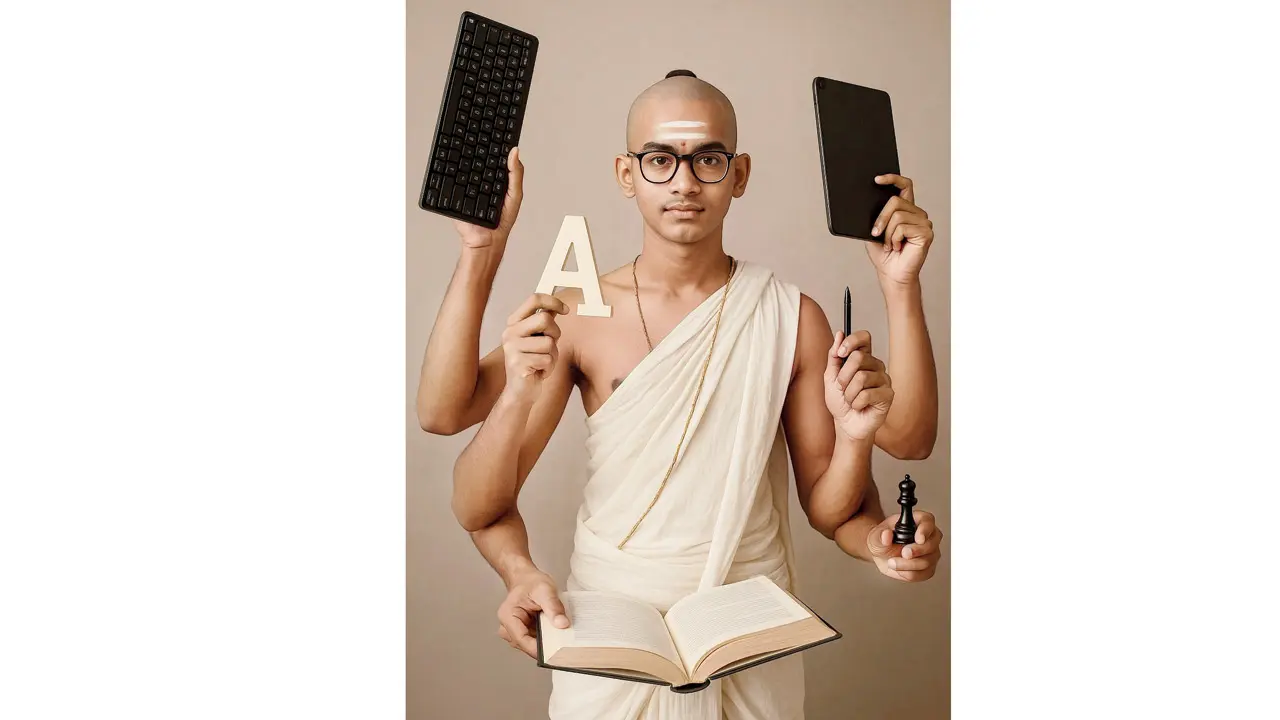What is it about people from Tamil Nadu and Telangana that makes them global powerhouses wherever brain power is the main power?

South Indian parents tend to ensure their children receive a high-quality education and exhort them to excel. Illustration by C Y Gopinath using AI
 There are some words only Shashi Tharoor is supposed to know.
There are some words only Shashi Tharoor is supposed to know.
Like éclaircissement. Psammophile. Murraya. Koinonia. Feldenkrais. Odylic. Pendeloque.
No one uses these words while chatting. Or while writing a letter. Or a book. They are words meant to put humans in their place and teach them humility.
But Faizan Aiki, 13, from Dallas, Texas, whose parents are from Hyderabad, knew éclaircissement like a family friend.
Bruhat Soma, a 12-year-old Floridian with roots in Telangana, had no problem with abseil.
Ananya Vinay, 12, from Fresno, California, whose parents are from Tamil Nadu, knew what marocain was. In 2017, she became the 13th consecutive Indian-American to win the prestigious Scripps National Spelling Bee, and the 18th of the past 22 winners with an Indian heritage.

Let’s talk about Bombai Click the QR code above to join my WhatsApp group to share your Bombai stories for my book—and perhaps answer some of my Bombai questions.
When I looked into their roots, two states cropped up again and again: Telangana and Tamil Nadu.
Intrigued, I began looking into Indians who ruled in international chess. As of May 2025, India has given the world 86 grandmasters. The latest is a 19-year-old prodigy called Gukesh Dommaraju who defeated the world’s seven-time grandmaster, 34-year-old Magnus Carlsen, in a classical match at the Norway Chess Tournament. Carlsen slammed his fist on the table and stormed out.
Gukesh comes from Tamil Nadu.
There are others: R Praggnanandhaa, Grandmaster in 2018 at age 13. Born in Chennai.
Vignesh NR, India’s 80th grandmaster in 2023, joining his brother Visakh NR, also a Grandmaster. Born in Kerala.
Arjun Erigaisi, born in Telangana, Grandmaster in 2018, aged 15.
Let’s add the legend: Viswanathan Anand, five-time world Chess Champion and one of the greatest and most influential chess players of all time. From Chennai, Tamil Nadu. His patronage alone pulled hundreds of young Tamilians to chess, with state support.
I decided to look at a somewhat older group, Indian CEOs of international corporations. No prizes for guessing which two states dominate.
Sundar Pichai, CEO, Google. From Madurai, Tamil Nadu.
Satya Nadella, CEO, Microsoft. Telangana.
Shantanu Narayen, CEO, Adobe. Telangana.
Arvind Krishna, CEO, IBM. Telangana.
Revathi Advaithi, CEO, Flex.
Tamil Nadu.
Vasant Narasimhan, CEO, Novartis.
What is it about people from Tamil Nadu and Telangana that makes them global powerhouses wherever brain power is the main power?
“They’re all TamBrams,” says Doc, my professor friend in Newcastle-on-Tyne. “They are products of the world’s largest successful experiment in eugenics. They have been bred like horses for these very skills and traits. Mathematics is instinct for them.”
This was weed-inspired nonsense and I told him so. Firstly, they’re not TamBrams; many of them speak Telugu. God knows how many of them are even Brahmin. We can also rule out both the education systems, American and Indian. All our grandmasters are India-educated; but our teenage spelling bee pros are US-educated; and the CEOs have studied here and abroad.
“Could be because they’re Dravidian,” Doc posited. “Maybe Dravidians are clever like that.”
There may be something in that. When the Indus Valley civilisation collapsed, people spread east and south, pooling finally in present-day Kerala, Tamil Nadu, Telangana/Andhra Pradesh and Karnataka. Ethnically and linguistically, they have nothing in common with the Indo-Aryan cultures that settled in the rest of India in later centuries. That’s India’s north-south divide right there.
Thank god for idli and sambar, the glue that keeps India together and whole.
A cognitive scientist broke down the mental superpowers common to grandmasters, spelling bee winners, CEOs and software coders: Pattern recognition, rule-based logic, memory and linguistic ability, long-range planning and calm discipline.
Southern states, and these two in particular, historically valorise knowledge. Tamil culture prizes arivu (knowledge) and pazhakkam (discipline). Telugu-speaking elite from the courts of the Kakatiyas to scholars like Pingali Venkayya have historically patronised literature, mathematics and linguistics. They emphasised nyaya (logic) and Vedic learning combined with linguistic excellence.
All good, but no Tamilian or Andhraite I know has “Vedic knowledge combined with linguistic excellence”.
“It was the British,” said Doc, struggling valiantly. “They poured money into building universities and centres of higher learning, especially in the south.”
Chennai and Hyderabad were major colonial administrative capitals, exposed to English-medium education, missionary schools and public institutions like Madras University and Osmania University.
“But the beneficiaries of those would have been the parents,” I argued. “How come the geniuses are in the next generation?”
Which brings us finally to South Indian parents. Especially those in middle- and lower-middle-class families see education as salvation. They somehow make sure their children receive a high-quality education in the best schools they can afford. They pay for coaching and continuously exhort them to excel. Children learn to respect teachers and knowledge, build focus and delay gratification. Over time, these breed analytical discipline, cultural humility and unique communication skills.
Their parents make huge personal sacrifices for their children. Gukesh Dommaraju’s father, an ENT surgeon, shifted to part-time work so that he could accompany his son to tournaments. To make up for lost income, his mother, a microbiologist, worked extra shifts. However, it is this sentence from her that captures the essence of the South Indian mind.
“I would be very happy to hear that you are a great chess player,” she told him once, “but I would be even happier to hear that you are an even greater person.”
You can reach C Y Gopinath at cygopi@gmail.com
Send your feedback to mailbag@mid-day.com
The views expressed in this column are the individual’s and don’t represent those of the paper.
 Subscribe today by clicking the link and stay updated with the latest news!" Click here!
Subscribe today by clicking the link and stay updated with the latest news!" Click here!








